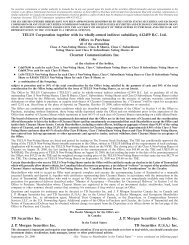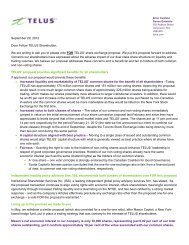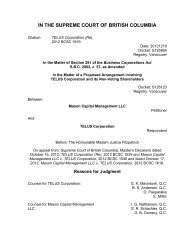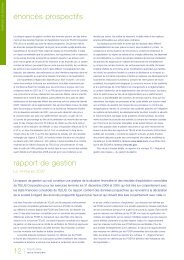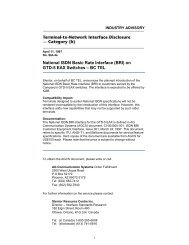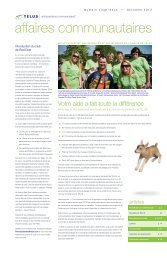Annual report - About TELUS
Annual report - About TELUS
Annual report - About TELUS
Create successful ePaper yourself
Turn your PDF publications into a flip-book with our unique Google optimized e-Paper software.
prices. Accordingly, there can be no assurance that<br />
<strong>TELUS</strong> can fully complete its $2.0 to $2.2 billion capital<br />
program in 2001, make additional acquisitions, or maintain<br />
current dividend levels.<br />
Dividend<br />
Current dividend levels may be inconsistent with the growth<br />
strategy of <strong>TELUS</strong><br />
The debt of <strong>TELUS</strong> is currently rated investment grade and<br />
<strong>TELUS</strong> plans to maintain this status. The business plan<br />
of <strong>TELUS</strong> contemplates increased capital expenditures in<br />
the growth areas of wireless, data and IP as well as to<br />
expand on a national basis. However, the extent of any<br />
future growth in operating cash flow may be constrained,<br />
among other reasons, by the flexibility of <strong>TELUS</strong> to fund<br />
attractive growth opportunities given the non-tax deductible<br />
nature and amount of current dividends relative to the<br />
objective of maintaining an investment grade credit rating.<br />
Also, future revenue and cash flow growth targets may<br />
not be achieved, reducing the financial flexibility to maintain<br />
the current dividend level. The dividend payout on shares<br />
of high growth acquisition targets (such as Clearnet in<br />
2000) is likely significantly less than that of <strong>TELUS</strong> and<br />
may be zero. Accordingly, a continued acquisition program<br />
involving share consideration may be inconsistent with<br />
maintaining current dividend levels. <strong>TELUS</strong> reviews its<br />
dividend policy quarterly and while there is no current<br />
plan to change the dividend payout, there can be no<br />
assurance that a future change will not be implemented,<br />
and it is difficult to predict what effect this may have on<br />
the price of <strong>TELUS</strong> shares.<br />
Human Resources<br />
The shortage of skilled employees is a challenge for all<br />
communications companies and <strong>TELUS</strong> is in the midst of<br />
negotiations with its union<br />
Shortage of telecommunications talent in the industry<br />
The ability to attract and retain talented employees is critical<br />
to the success of <strong>TELUS</strong> in meeting customer needs.<br />
People have never been as important to this organization<br />
as they are today given the increased focus on wireless,<br />
data and IP services. This, coupled with low unemployment<br />
rates, an aging workforce with increasing retirements<br />
and an imbalance between supply and demand of<br />
talent in the telecommunications market, creates a challenge<br />
for <strong>TELUS</strong> and its competitors. If <strong>TELUS</strong> does not<br />
attract and retain talented employees, it may adversely<br />
affect <strong>TELUS</strong>’ growth objective and limit <strong>TELUS</strong>’ ability to<br />
deploy new technology. (See “Organizational restructuring<br />
and <strong>TELUS</strong> Mobility and Clearnet integration.”)<br />
New Contract Bargaining with the Telecommunications<br />
Workers Union (TWU)<br />
In 2000, <strong>TELUS</strong>’ application to the Canada Industrial<br />
Relations Board (CIRB) resulted in a new consolidated<br />
bargaining unit. There are five collective agreements<br />
covering over 17,000 employees in Alberta and British<br />
Columbia. At the end of 2000, these agreements expired<br />
and negotiations for a single new collective agreement<br />
commenced in November 2000. Bargaining sessions<br />
are continuing.<br />
<strong>TELUS</strong> is committed to achieving a collective agreement<br />
that is fair to employees while maintaining customer<br />
focus and being sufficiently flexible to enable <strong>TELUS</strong> to<br />
operate in a highly competitive market. <strong>TELUS</strong> recently<br />
received a decision from CIRB that declined to specify<br />
a geographical limitation of the new bargaining unit to<br />
Alberta and British Columbia. <strong>TELUS</strong> is currently reviewing<br />
this decision to determine the potential impacts.<br />
There can be no assurance that compensation expense<br />
will be as planned, or that reduced productivity and work<br />
disruptions will not occur.<br />
Organizational restructuring and <strong>TELUS</strong> Mobility and<br />
Clearnet integration<br />
Restructuring and integration activities introduce potential for<br />
temporary customer service degradation<br />
<strong>TELUS</strong> began a company-wide major organizational<br />
restructuring in the fourth quarter of 2000 that extended<br />
into 2001. In addition, certain systems and processes of<br />
the Clearnet organization continue to be integrated with<br />
those of both the western <strong>TELUS</strong> Mobility organization<br />
and QuébecTel Mobilité organization to create a cohesive<br />
national <strong>TELUS</strong> Mobility unit. These initiatives may distract<br />
the organization and negatively impact customer service<br />
levels, <strong>TELUS</strong>’ competitive position and financial results.<br />
Clearnet integration benefits may not be realized<br />
There can be no assurance that the future operating<br />
expense, capital expenditure and tax savings expected<br />
by management and investors in connection with the<br />
Clearnet acquisition, will materialize as planned.<br />
> 57



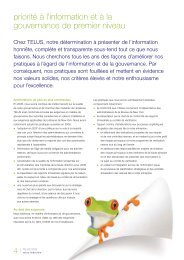
![DISK004:[98CLG6.98CLG3726]BA3726A.;28 - About TELUS](https://img.yumpu.com/16786670/1/190x245/disk00498clg698clg3726ba3726a28-about-telus.jpg?quality=85)
